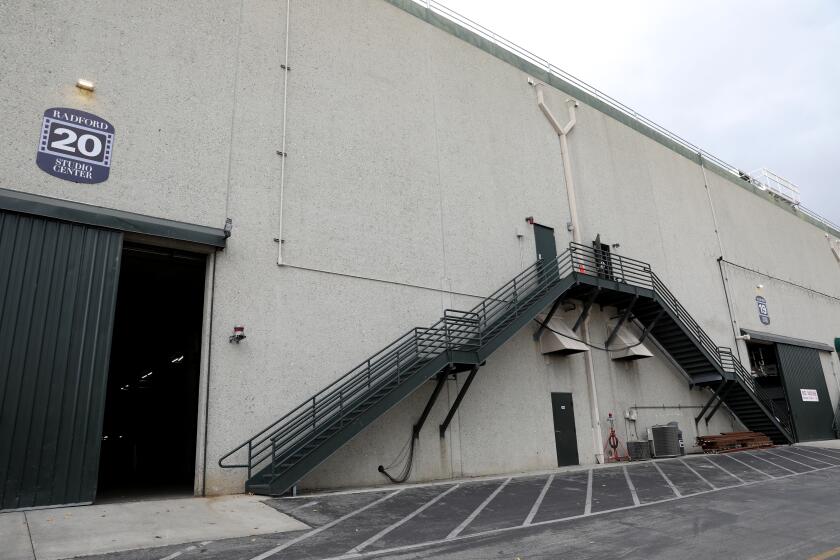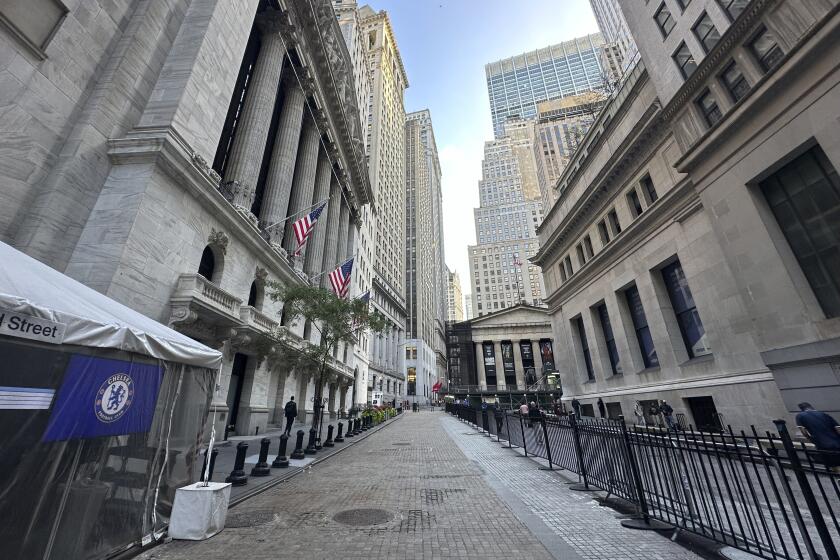Inflation Data Hammer Bonds, Broad Market
A late round of bargain hunting Thursday saved the Dow Jones industrial average from ringing in the new year the way it rang out the old, while bond prices fell in their worst two-day performance since July.
But most stock measures suffered sizable losses for the second straight session after another unexpectedly strong economic reading heightened worries about inflation and sent interest rates soaring in the bond market.
The Dow fell 5.78 points to 6,442.49, bouncing back from an 88-point deficit over the last half an hour. The blue-chip barometer slid more than 95 points in the morning after a surprisingly robust report on the manufacturing sector.
Stocks had opened higher with bonds, but they quickly pulled lower in a follow-through to Tuesday’s year-ending sell-off, which shaved 101 points off the Dow.
The retreat was sparked by a monthly survey of purchasing managers that showed more of them taking increased orders and paying higher prices. The report fueled concern that faster economic growth could stoke inflation and raise borrowing costs.
“There’s nothing more fundamental than inflation expectations and interest rates,” said Robert Stovall, president of Stovall/Twenty-First Advisers. “If something happens to make that less favorable, then bonds will lead stocks lower.”
The yield on the benchmark 30-year Treasury bond rose to its highest level in more than two months, to 6.74% from 6.64%. The bond market was closed Wednesday for the New Year’s holiday.
Government yields help set the cost of corporate and individual borrowing, and, when rising, they are a twofold attack on stock prices. More expensive borrowing hampers growth, and higher yields reduce investors’ willingness to pay a premium for stocks.
That apprehension caused stocks to fall broadly. The number of declining shares outnumbered those that rose by a margin of more than 9 to 4 on the New York Stock Exchange.
The benchmark Standard & Poor’s 500 index fell 3.75 points, or 0.51%, to 736.99, with computer software, semiconductor and electrical equipment companies retreating most.
The Nasdaq composite index, full of last year’s top-performing computer industry shares, suffered most, dropping 10.33 points, or 0.8%, to 1,280.70.
But few analysts were alarmed by the latest data. And, like they did Tuesday, many attributed at least some of the intensity of the day’s selling to the lighter volume of the holiday season, which can leave the market prone to wide swings.
“We’ve got to get through this week and get everything fully staffed and back to normal,” said Robert Froehlich, chief investment strategist at Van Kampen American Capital in Oakbrook Terrace, Ill., noting another report Thursday showing that first-time claims for unemployment benefits rose to the highest level since summer. “That’s not a sign of a fast-growing economy.”
Among Thursday’s highlights:
* Leading the day’s Dow gainers were the “dogs of the Dow,” so named because these stocks pay among the 10-highest dividends. 3M, paying a 2.3% yield, rose 3 1/8 to 86. GM, up 2 5/8 to 58 3/8, yields 2.7%.
* Recent strength in the dollar depressed firms with significant overseas sales, including Philip Morris, down 1 5/8 to 111 3/8; Boeing, down 2 5/8 to 103 7/8; and Procter & Gamble, down 7/8 to 106 3/4.
* A number of computer-related companies also backtracked. Dell Computer slid 1 7/8 to 51 1/4 and US Robotics dropped 4 3/8 to 67 1/4.
* Rendering plant operator Darling International fell 2 3/4 to 26 3/4 after the Clinton administration proposed a ban on feeding processed animal parts to other animals, to prevent a breakout of “mad cow disease.”
* Interest-sensitive companies such as banks fell for a second session. Barnett Banks slipped 1 1/8 to 40 and Chase Manhattan fell 1 3/8 to 88.
Meanwhile, grain prices staged a strong rally as commercial companies and speculators bought heavily on indications that demand was picking up.
At the Chicago Board of Trade, March wheat rose 8 cents a bushel to close at $3.89 1/4 as talk circulated on the trading floor that Egypt, a big buyer of U.S. wheat, would soon purchase up to 500,000 metric tons.
Overseas, Frankfurt’s DAX index fell 1.4% and London’s FTSE-100 fell 1.5%. Japanese financial markets were closed.
More to Read
Inside the business of entertainment
The Wide Shot brings you news, analysis and insights on everything from streaming wars to production — and what it all means for the future.
You may occasionally receive promotional content from the Los Angeles Times.






